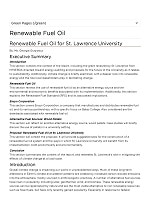Internship (paid) Job Summary:The intern will participate as a member of our multi-disciplinary team executing programs...
» Read MoreReducing our carbon footprint from our energy use sometimes requires us to think about new ways to source our energy. While many companies and institutions have made great strides in reducing their footprint through energy efficiency and renewables such as solar, achieving carbon reductions from central heating plants can be especially challenging. The development of renewable fuel oil, produced from locally-sourced waste wood products, could replace traditional fuel oil and natural gas to significantly lower the carbon footprint.
What is Renewable Fuel Oil?
- Renewable fuel oil offers a near carbon-neutral replacement for traditional fuel oil or natural gas for use in central heating plants
- Higher acidity might require retrofit
- Competitive cost-per-Btu and financial incentives allow for appreciable payback periods
Why Colleges?
As institutions strive to reduce their carbon footprint, facility heating demands continue to be a significant obstacle towards achieving desired reductions. RFO offers a sustainable solution to significantly reduce an institutions’ carbon footprint by utilizing virtually carbon-neutral renewable sources. Appreciable payback periods and financial incentives both in place and on the horizon offer strong economic considerations, and locally sourced feedstocks provide added economic benefits to various industries across the region. Institutions and other large facilities have been able to utilize renewable fuel oil to reduce their greenhouse gas emissions and improve their bottom line.

Case Studies and Reports
Meeting Notes and Presentations
Meeting Notes
Presentations
Events
There are no events to display at this time.
Contact Us
Learn more about renewable fuel oil for colleges and universities.









